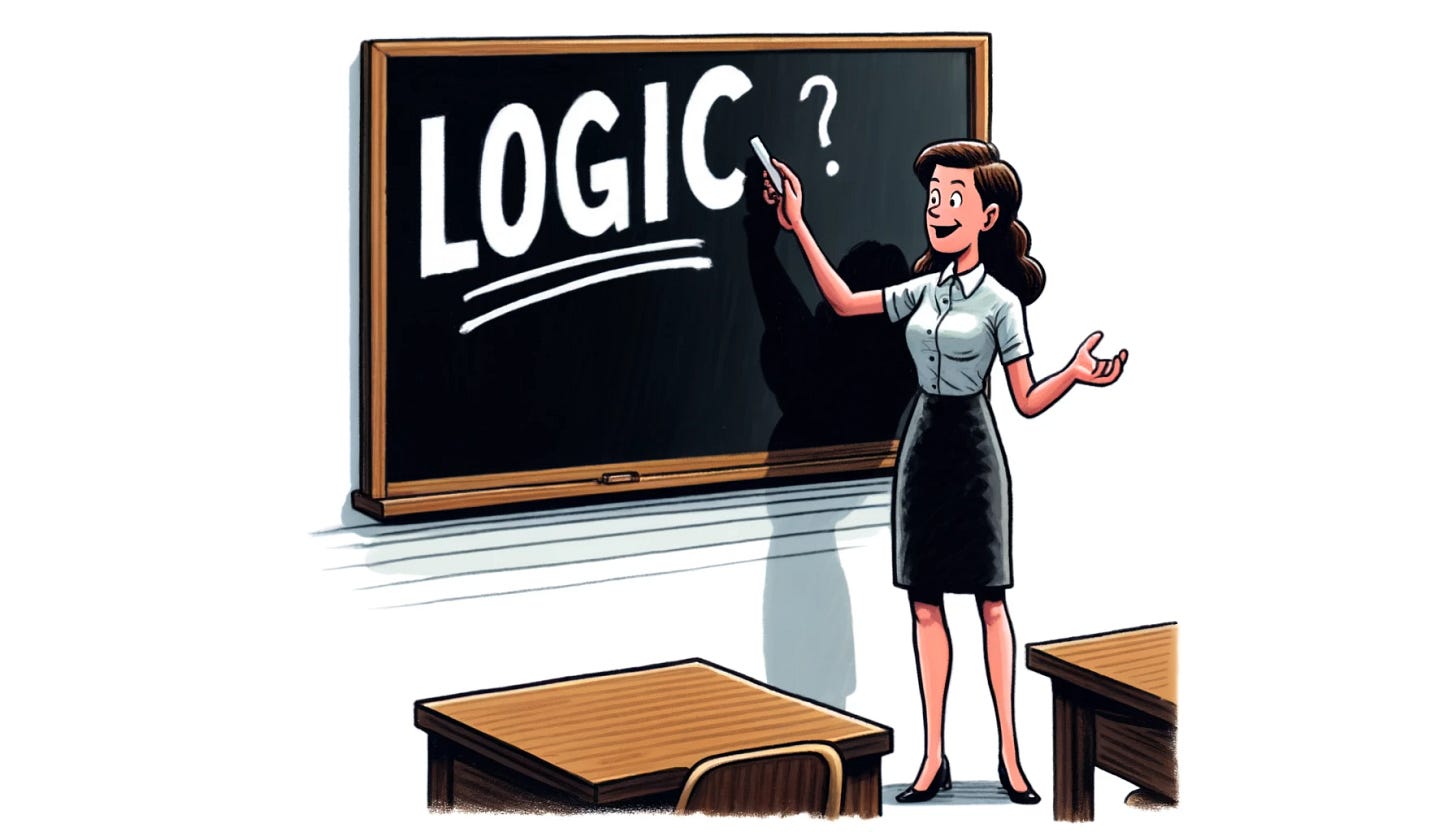
Many students still learn Latin in secondary school (i.e., pre-university education). When I myself made the decision to take Latin classes back in high school, I was influenced by the argument that Latin helps you think logically.
In a very limited sense, the argument is not completely wrong, but it is also not very convincing for at least two reasons.
What does Latin have to do with logic?
To learn Latin, you need to learn a set of formal rules. Formal rule-following consists in adhering to explicitly defined rules, ensuring that each action or decision follows a predetermined set of guidelines: For instance, grammar rules about the position of grammatical word types in a sentence such as “"In a declarative sentence, the typical word order is Subject-Object-Verb (SOV)."
Since formal rule-following is one aspect of formal logic, as we will see below, it might seem as if Latin helps to enhance our logical thinking abilities.
Is Latin more formal than other languages?
Now, importantly, Latin is not more guided by formal rules and in that sense “logical” than other languages. Merely the learning focus in Latin education is put on translation and formal grammar compared to other languages, which are learned by speaking and writing.
This focus on grammar in Latin can make you more attuned to formal rule-following – but it most certainly does not have to. If other languages come with a good grammar section, they can bring that lesson home too.
Is formal rule-following sufficient for logical thinking?
More importantly, formal rule-following is only one aspect of formal logical thinking. And the rules learned in Latin are arbitrary as all grammatical rules, have lots of exceptions and do not pertain to the rules of reasoning.
Compared to that, logical thinking involves systematically using established rules of reasoning to draw conclusions from given information, ensuring that each step in the thought process is coherent and justified.
In that sense, you definitely do not learn logical thinking in Latin.
Why not learn logic directly?
The more important question is, why not teach logic in school if we want our children to learn logical thinking? That does not have to be formal logic, let alone, symbolic logic, as we know it from contemporary academic philosophy, mathematics, or computer science, which might or might not have anything to do with human logical reasoning at all.
Instead, we could teach in schools critical thinking, simple logical reasoning skills that come naturally to us, in the form of informal logical reasoning or those that have been developed and formalized since ancient philosophy and medieval philosophy respectively. Take, for instance, the logical forms modus ponens and modus tollens.
Modus ponens
P → Q
P
∴Q
Like all formal nomenclature, this looks more complex than it is. An expression of modus ponens in natural language is: "If it rains, then I will get wet." "It rains." "Therefore, I will get wet." That is, P and Q stand for sentences, the arrow expresses that the sentences are housed in an “if…then…” structure, and this “∴” little sign stands for “therefore”.
Modus tollens
P → Q
¬Q
∴¬P
Modus tollens is as simple: “If it rains, then I will get wet." "I am not wet." "Therefore, it does not rain." The perhaps more educational variant here is the fallacy that can be considered a misapplication of modus tollens.
P → Q
¬P
∴¬Q (invalid inference)
“If it rains, then I will get wet." "It does not rain." "Therefore, I will not get wet." Why is this not a valid inference? Because you could get wet in many other ways, such as accidentally spilling water on your pants. The conclusion drawn from the original premises does not necessarily follow because there are other conditions (like spilling water) that could lead to getting wet, independent of it raining.
This sentence highlights the flaw in the above depicted fallacy by showing an alternative cause for the outcome, thereby undermining the necessity of the original causal relationship presented in the argument.
Who, then, is qualified to teach logical thinking in schools?
Quite frankly, I think everyone with a university education can teach logical thinking in schools. If you believe in the value of “credentialized” expertism, everyone who took a critical thinking or logic class at university level, if local universities off such courses, like in the US, can teach logical thinking. And if you need it even more technocratic than that, everyone with a degree in philosophy or mathematics should be able to teach logical thinking.
Too difficult for pupils?
Some people might think that logic is too difficult for pupils when it comes to the entry-level difficulty. I do not think so at all.
Informal, introductory formal and even symbolic logic seem easier to learn than Latin itself, calculus, or probability calculus, which many pupils have to study for mathematics or physics at the high school level in various countries.
Likewise, the hermeneutic complexity of a text like Goethe’s Faust, which I had to learn in high school, is significantly higher than the complexity of introductory logic, which is based on our natural reasoning abilities.
Conclusion (and yes, that is a logic joke 😊)
Independent of whether these logical forms make up logical thinking, they are a good way to support the education of logical thinking—more so than the arbitrary grammar rule-following of Latin.
Not only that. Learning how to think and argue properly is probably the most central intellectual skill we can teach in school. That this is not happening right now in most countries is beyond bizarre.



